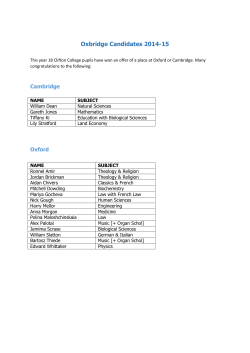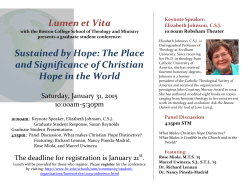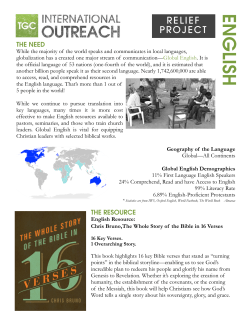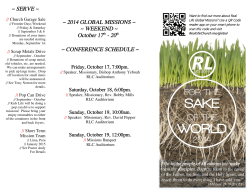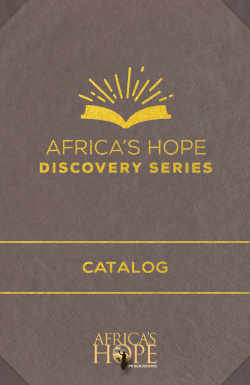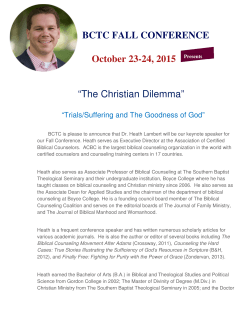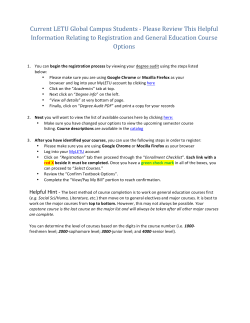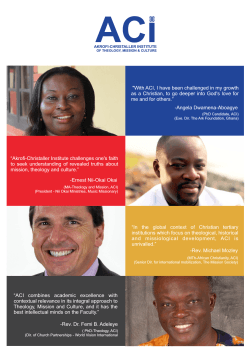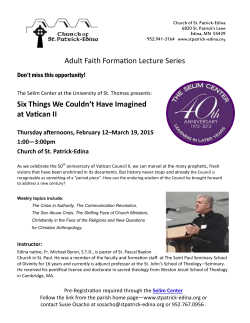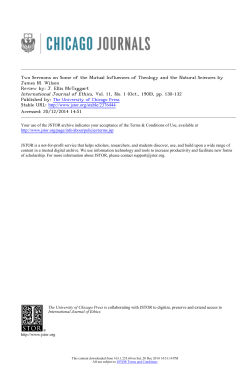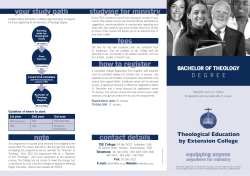
Document 359591
Department of Theology and Religious Studies P. O. Box 267, Meru, 60200, Kenya Tel: (0164) 30301, 31229, 30367, 31171 Fax: (0164) 30162 Email: theology@kemu.ac.ke MASTER OF ARTS IN MISSION STUDIES COURSE CODE COURSE TITLE CREDIT HOURS SENIOR LECTURER CONTACT MTEO 500 BIBLICAL FOUNDATIONS FOR MISSIONS 3 REV. DR. JOHN KOBIA ATAYA (Ph.D.) kobiaataya@yahoo.com mobile 0726213924 INSTRUCTION MATERIAL FOR DLM STUDENTS © September 2014 Purpose of the course The purpose of the course is to provide knowledge and skills on Biblical foundations for missions. Expected learning outcomes By the end of the course the student should be able to: 1. Explain the main tenets of Biblical foundations for missions 2. Analyse the Biblical texts on missions 3. Interpret the Biblical theology on missions Course Description Explanation of main tenets of Biblical foundations for missions: definitions, missio-Dei, missio-Ecclesiae, mission as evangelism, great commission. Analysis of Biblical texts on missions: Jonah, Deutero-Isaiah, Matthew, Luke and Acts of the Apostles. Interpret Biblical theology for mission: mission as salvation history, mission in the context of religious plurality, mission as liberation theology, mission in eschatological perspectives, the West as a mission field in the 21st Century Course Texts Arias, M. and Johnson, A. (1992) The Great Commission: Biblical Modes for Evangelism. Nashville: Abingdon Press. Mugambi, J. N. K. (1989) The Biblical Basis For Evangelization: Theological Reflections Based on an African Experience. Nairobi: Oxford University Press. Nazir-Ali, M. (1991) From Everywhere To Everywhere: A World View of Christian Mission. London, Glasgow, Sydney, Auckland, Toronto and Johannesburg: William Collins & Co. Ltd. Nthamburi, Z. (1991) The African Church at the Crossroads: Strategy for Indigenization. Nairobi: Uzima Press. Ferguson, S. B. and Wright, D. F. (eds) (1988) New Dictionary of Theology. Leicester, England, Downers Grove, Illinois, USA: Inter-Varsity Press. Teaching methods Lectures Individual/group presentations Page 1 of 2 Discussion Assessment methods CATs End of Trimester exam 60% 40% COURSE OUTLINE 1.0 Introduction 2.0 Delineation of key concepts 2.1 Mission, Missions, Missiology and Mission Studies 2.2 Missio-Dei 2.3 Missio-Ecclesiae 2.4 Mission as evangelism 2.5 Discussion task 3.0 The mission mandate in the Old Testament 3.1 The call of Israel to be a blessing to the other nations- Genesis and Jonah 3.2 Further OT strategy for mission: the study of Jonah, Deutero – Isaiah 3.3 Discussion task 4.0 The mission mandate in the New Testament 4.1 The Great commission-Matthew 28 4.2 Further NT strategy for mission: the study of Luke and Acts of the Apostles 4.3 Discussion task 5.0 Theology of mission 5.1 Mission as salvation history 5.2 Mission in the context of religious plurality 5.3 Mission in eschatological perspective 5.4 Mission as liberation Theology 5.5 The West as a mission field in the 21st Century 5.6 Discussion task 6.0 Conclusion 1. 1ST ASSIGNMENT 3RD TRIMESTER 2014 “Then he said to them ‘These are my words that I spoke to you while I was still with you-that everything written about me in the law of Moses, the prophets, and the psalms must be fulfilled”. Then he opened their minds to understand the Scriptures, and he said to them, “thus it is written, that the messiah is to suffer and to rise from the dead on the third day and that repentance and forgiveness of sins is to be proclaimed in his name to all nations; beginning from Jerusalem. You are witnesses of these things. And see I am sending upon you what my father promised; so stay here in the city until you have been clothed with power from on high” Luke 24: 44-49. Discuss the mission theories arising from this Lukan great commission. Due date October 17th 2014 Marks 20/40 2. 2ND ASSIGNMENT 3RD TRIMESTER 2014 Provide analysis of the Lukan great commission indicating with examples how the Churches in Kenya are applying the mission principles. Due date November 14th 2014 Marks 20/40 Page 2 of 2
© Copyright 2025
